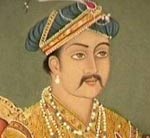Akbar Biography
Akbar The Great (1542 – 1605)
Akbar was the greatest of the Moghul emperors, consolidating a large empire across India, and establishing a culture promoting the arts and religious understanding.
Short Biography of Akbar
 Akbar was the son of Humayun, grandson of Babur, and became the third Moghul Emperor. Although the first part of his reign was taken up with military campaigns, Akbar displayed a great interest in a wide variety of cultural, artistic, religious and philosophical ideas. Akbar was also know for his religious tolerance and, although a Muslim, took an active interest in other religions.
Akbar was the son of Humayun, grandson of Babur, and became the third Moghul Emperor. Although the first part of his reign was taken up with military campaigns, Akbar displayed a great interest in a wide variety of cultural, artistic, religious and philosophical ideas. Akbar was also know for his religious tolerance and, although a Muslim, took an active interest in other religions.
Akbar came to the throne, aged 14, on the death of his father Humayun. For the next 20 years, he had to fight to defend and consolidate the Moghul empire. He faced threats from the Afghans in the North and from the Hindu King, Samrat Hemu.
As Akbar was very young on ascending to the throne, the running of Moghul Kingdom was left to Bairam Khan an Afghan Shia Muslim. Bairam was a great military leader and helped secure the Moghul Empire. However, he was not liked by many for the absolute power he wielded and also the fact he was not a Sunni Muslim. At one point he was encouraged to go on a pilgrimage to Mecca. Akbar sent an army to escort Bairam Kham, but Bairam was annoyed at the ostracism of being sent on pilgrimage. Therefore, he turned on Akbar’s army and was later captured. Bairam was taken to Akbar where many wanted him to be executed. However, Akbar refused to execute Bairam because had done much for him in the past. He forgave Bairam and allowed him to live at the expense of the court. Throughout his life, Akbar often showed mercy and forgiveness to his enemies – not least to his own brother who plotted against him.
Akbar was known to have many good qualities. He was fearless in battle and willing to risk his life. He was generous to friends and rewarded loyalty. In his diet he was quite frugal, preferring a vegetarian diet. He had a great interest in religion and encouraged representatives of different religions to come to his court to debate great religious ideas. Akbar felt that the different religions were compatible with each other – offering different approaches to the same goal. Towards the end of his life he tried to create his own religion – an amalgamation of different religious traditions. However, it never extended beyond his personality and soon faded away after his death.
No comments:
Post a Comment